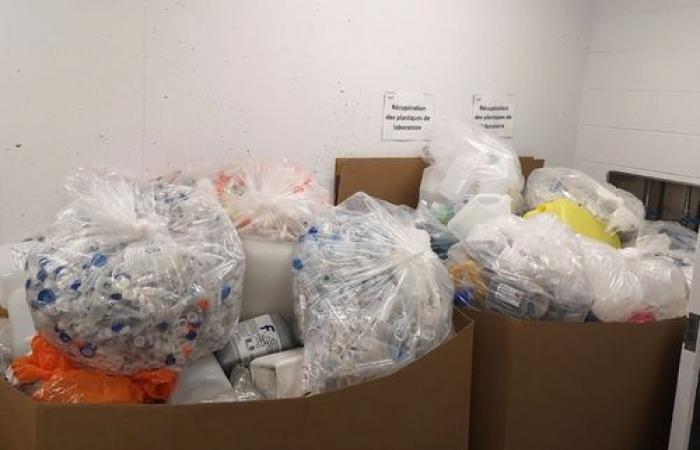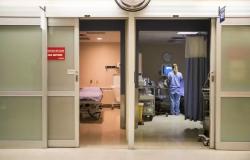Building the future sustainably (CLAD), one of the four major projects of the Innovation Laboratory of the University of Montreal, is launching a new call for projects to support the research units, centers and laboratories of the campuses of the UdeM who wish to engage in an approach to eco-responsibility in research. The total envelope of $100,000 will finance structuring initiatives and projects. The deadline to submit an application is December 15.
Financial support for four projects in 2024
In 2024, four projects benefited from financial support from the Vice-Rectorate for Research, Discovery, Creation and Innovation (VRRDCI), through additional project grants from the Research Support Funds of the Government of Canada, to optimize obsolete or polluting research equipment for the benefit of solutions with a lower environmental impact for a total amount of nearly $90,000:
- program to extend the life cycle of shared equipment in partnership with the Faculty of Pharmacy (led by Xavier Banquy);
- change of cold room compressors in partnership with the Faculty of Veterinary Medicine (led by Frédéric Berthiaume);
- program to extend the lifespan of lead-acid batteries in partnership with the Faculty of Medicine (led by Benoît Bessette);
- performance monitoring and replacement of ultra-low temperature freezers in partnership with the Biomedical Innovation Center of the Faculty of Medicine (led by Nicolas Stifani).
The last project is a pilot project aimed at promoting eco-responsible use of ultra-low temperature freezers using data collected by temperature sensors. Thus, it becomes possible to designate the most energy-consuming models, to diagnose the reasons for overconsumption and to provide simple and sustainable solutions. In addition, the temperature of certain freezers went from -80°C to -70°C without altering the integrity of the stored samples, which represents colossal energy savings.
A unique approach in Quebec
By progressively optimizing each research tool or instrument, the UdeM scientific community is tackling the ecological and environmental issues it faces. “This strategy of supporting the eco-responsibility of research appears quite unique in Quebec. It responds to a growing desire of our community, sensitive to the major societal changes necessary for a socio-ecological transition in line with current environmental reality,” says Luc Stafford, associate vice-rector for research at VRRDCI and head of the CLAD project.
Collaborative projects from 2023
Luc Stafford
Credit: Amélie Philibert, University of Montreal
Aware of the challenges to be met in this sector, UdeM, through the VRRDCI and the CLAD project in particular, had already initiated this financing operation with laboratories in 2023. Let us recall the projects which were supported on this occasion:
- green microscopy: replacement of mercury light sources in collaboration with the Faculty of Medicine and the Center for Biomedical Innovation (led by Nicolas Stifani);
- replacement of obsolete oil pumps with dry pumps (without consumables and less energy consuming) in collaboration with the Faculty of Arts and Sciences (led by Charles Moderie);
- highlighting single-use plastics from laboratories in collaboration with the Faculty of Arts and Sciences (led by Kevin Wilkinson).
This latest collaborative project, set up at the Faculty of Arts and Sciences and supported by the Sustainable Development Unit and the Buildings Department, aimed to recover and recycle single-use rigid plastics with the help of CED-LO, a Quebec company. Around sixty laboratories responded positively to this proposal. The project was able to contribute to reducing the environmental footprint of research at UdeM; its greenhouse gas emissions report is forthcoming and will help promote the initiative across the mountain campus. Already, a good part of the waste can now be recycled at the MIL campus: paper, cardboard and soft plastics in traditional recycling, but also hard scientific plastics in the new bins. Some laboratories have also taken the initiative of purchasing boxes to collect their plastic gloves through the Thermo Fisher program.
Another project to highlight: the replacement of end-of-life microscope lamps powered by mercury, a material harmful to the environment and humans, with light-emitting diodes and lasers, two less energy-consuming and more sustainable technologies. “We are delighted that UdeM responded positively to our faculty proposal and supported us in this approach to reduce our environmental impact and make significant energy savings,” concludes Nicolas Stifani, coordinator of the microscopy platform of the Faculty of Medicine, which led the project and participated in its realization.
Learn more
Click on the links to find out more about Building the future sustainably and the call for projects to support research units, centers and laboratories that wish to engage in an approach to eco-responsibility in research.






